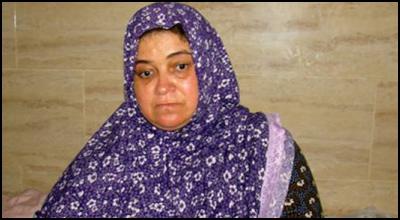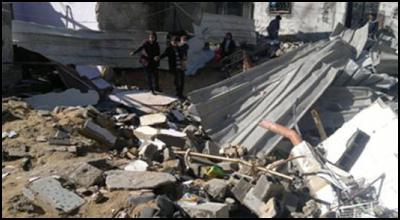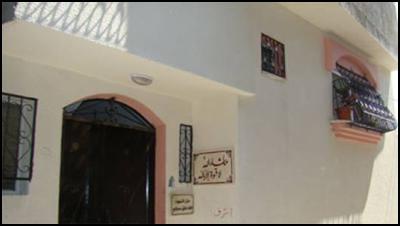"What Is a New Home Without the Sight of My Children?"
"What Is a New Home Without the Sight of My Children?"

Amna Hijazi (46), mother of Mohammed and Suhaib Hijazi and wife of Fouad Hijazi, who were killed in the Israeli offensive in November 2012
At approximately 19:20 on Monday 19 November 2012, during the latest Israeli offensive on the Gaza Strip, an Israeli military plane fired a missile at the house of Fouad Khalil Hijazi (46) in the north of Jabalya. The house was destroyed, and Fouad and his two children, Mohammed (4) and Suhaib (2), were killed. 28 civilians, including 7 residents of the house, were also injured in the accident. The house was reduced to rubble, totally levelled by the Israeli airstrike. Amna Hijazi (46), Fouad's wife and mother of the eight Hijazi children, was pulled from the rubble. Due to the severity of her injuries, she was transferred to a hospital in Al Arish in Egypt to receive medical treatment. A photograph of the Hijazi family funeral, taken by Swedish photographer Paul Hansen, became an iconic image of the November offensive and was named World Press Photo of the year for 2012 (http://www.worldpressphoto.org/awards/2013/spot-news/paul-hansen ). Amna was not present at the funeral. When she awoke in the hospital, a few days after the attack, she was told of the death of her husband and two of her children.

The remnants of the Hijazi family home, following the November 2012 attack
Prior to the attack, the Hijazi family consisted of ten members: Amna, Fouad, and their six sons and two daughters. All ten family members were at home when the airstrike shook the house. Fouad, Suhaib and Mohammed were killed instantly in the attack. The rest of the family sustained injuries. The wreckage of the Hijazi family home has since been removed and a new house stands in its place in the densely-populated area of Block 8 of Jabalya refugee camp. The only reminder of the attack is a sign hanging on the door which reads ‘The home of martyr Fouad Hijazi'. Amna was separated from her shattered family for months while receiving medical treatment in Egypt, but is now settled in her reconstructed house and reunited with her surviving children.

The Hijazi family home,
which has been recently reconstructed
Recounting the events of the day, Amna says: "We were all sitting at home and following the news of the consistent attacks during the offensive. I kept my children around me. The little ones were playing on their bikes while the others were watching the news with us. The last thing I remember was watching the 'Breaking News' on TV. Then, suddenly, we were the news. When I woke up, I was told that I had been found somewhere near the stairs where I was buried under the wreckage of my own house."
After six days in a hospital in Al Arish, Amna was transferred to Salam Hospital in Cairo. When she finally awoke, she was suffering temporary memory loss: "I woke up in the Intensive Care of the Salam hospital in Cairo. I did not remember what had happened. I did not know why I was in the hospital. My cousin, who had accompanied me to Egypt, told me that I had fallen, but I couldn't remember falling so I could not believe her. I could not remember that the house had been directly targeted. However, visitors kept coming and I started to sense that there was something wrong. But they kept lying to me. They didn't tell me that the house had been bombed. Then I started recollecting the events of the days of the offensive. I started to remember that Gaza had been under attack and that people were dying. I started enquiring about my little children, Mosa'ab, Sohaib, and Mohammed. They were the youngest. When I was informed that my husband and my two little children had been killed, life turned black in my eyes, and I wished I were dead too. They were just children. They were only playing."
Amna spent two weeks in hospitals in Egypt and then returned to Gaza, where the lack of proper medical treatment resulting in a worsening of her condition. She was forced to leave her family again in order to access proper medical treatment in Egypt. At present, due to her severe head injury, she is still unable to control her movements and cannot walk properly. However, Amna, now the primary caretaker for the family, felt the need to return to Gaza to try to piece together a life for her children.
"When I came back, everyone met me at the hospital, except for my daughter Nour. When I saw her at home, lying on her back and unable to move, I realised that she had also been injured. I started weeping. She had to spend two months in bed and another month not moving. Suhaib's twin brother was psychologically traumatised. He was feeling the loss of his twin brother. He had difficulties in speaking. When he first started speaking again, he would just point to the poster of his father and to Suhaib's picture. The children were badly affected by my absence. They became very unsettled, and we haven't managed to settle back to our life yet."
The Hijazi family spent around three months in a rented house before their home was reconstructed. However, as Amna explains, the reconstruction of the house cannot compensate for the loss of human lives: "What is a new home without the sight of my children? What is a brick without their laughter? They made the house alive. Now, they are gone. They were killed here. They were buried by the rubble of this house where we are sitting. I remember them every day. During Ramadan, I remembered how we used to sit around the same table like a family. I would have understood it if they had been holding a gun and resisting but they were not; they were only children. They didn't understand what was happening around them."
The extensive destruction of property was a prominent feature of the latest Israeli offensive, during which civilian objects were often the direct targets of Israeli military planes. According to follow-up investigations by PCHR, 61 civilian houses were directly targeted by Israeli military planes during the last offensive. The bombing led to the complete destruction of 126 houses, as well as 191 building units which were home to 216 families comprising 1,229 members, of which 710 were children. In most cases, families did not receive any warning before their houses were directly bombed. Homes were demolished while their civilian residents were present.
For anyone, the loss of a home is very painful, but Palestinian women in particular tend to invest all their resources in their homes. For women like Amna, the end of the offensive was not the end of the struggle; they were then faced with the task of rebuilding their destroyed homes and piecing together their shattered lives. With the lack of any sustainable income, especially for families that have lost their breadwinners during the offensive, rebuilding one's house is an extreme financial burden. Women become even further traumatised by the fear of economic hardship and impoverishment resulting from losing one's home and property. As a result, many become aid-dependent, damaging what self esteem and sense of independence they have left.
As a legal representative of the Hijazi family, PCHR is following up their legal case locally and internationally. On 23 December 2012, PCHR filed a civil complaint with the compensation office of the Israeli authority clarifying that the attack was carried out against mere civilians which is prohibited by international humanitarian law (IHL) and demanding remedy for victims. On 2 February 2013, the compensation office replied acknowledging that they received the complaint and they will take due procedures. On 8 June 2013, PCHR received another response requesting an original power of attorney and further information on the specific location of the attack. Another complaint was filed with the military prosecutor on 10 February 2013 demanding criminal investigation of the attack and legal prosecution. However, PCHR received no response in regard of the investigation up to this moment.
As the Occupying Power of the Gaza Strip, Israel must fulfil its obligations under the international human rights treaties and covenants it has signed and ratified. Under IHL in particular, the principle of distinction demands that parties to a conflict must, at all times, distinguish between civilians and combatants, and civilian objects and military targets. Violations of this principle constitute war crimes, as defined in, inter alia, Articles 8(2)(b)(i), and (ii) of the Statute of the International Criminal Court. Depending on the scale of such attacks, and whether they form part of a plan or policy, such attacks may also constitute the crime of willful killing and be a grave breach of the Geneva Conventions.
In addition, international humanitarian law (IHL) requires that any attack must be proportionate. An attack which may be expected to cause incidental loss of civilian life, injury to civilians, damage to civilian objects, or a combination thereof, which would be excessive in relation to the concrete and direct military advantage anticipated. Furthermore, under the principle of precaution, customary IHL requires that all feasible precautions must be taken to avoid, or at least to minimise, incidental loss of civilian life, injury to civilians and damage to civilian objects.
IHL grants children two forms of protection: first, the general protection granted to them as non-combatant individuals; second, special protection as they are considered to be a particularly vulnerable group in times of war and armed conflict.
According to Article 53 of the 1949 Fourth Geneva Convention, any destruction by the Occupying Power of real or personal property belonging individually or collectively to private persons, or to the State, or to other public authorities, or to social or cooperative organisations, is prohibited, except where such destruction is rendered absolutely necessary by military operations. Article 147 of the Fourth Geneva Convention states that extensive destruction of such protected property, which cannot be justified by military necessity, is a grave breach of IHL.
In addition, Article 8(2)(b)(iv) of the Rome Statute of the International Criminal Court states that it is a war crime to intentionally launch an attack in the knowledge that such an attack will cause incidental loss of life, injury to civilians, damage to civilian objects, or widespread, long-term and severe damage to the natural environment which would be clearly excessive in relation to the concrete and direct overall military advantage anticipated.
ENDS


 Save The Children: A Third Of 5-Year-Olds Will Be Spared Unprecedented Lifetime Exposure To Dangerous Heat If World Meets 1.5°C Temperature
Save The Children: A Third Of 5-Year-Olds Will Be Spared Unprecedented Lifetime Exposure To Dangerous Heat If World Meets 1.5°C Temperature Access Now: NSO To Pay $168 Million In Damages To WhatsApp For Pegasus Spyware Hacking
Access Now: NSO To Pay $168 Million In Damages To WhatsApp For Pegasus Spyware Hacking NIWA: New Study Reveals Climate Change Is Already Impacting The Andes
NIWA: New Study Reveals Climate Change Is Already Impacting The Andes Friends of Tonga: Bilingual Reading Apps Aim To Boost Literacy In Tonga
Friends of Tonga: Bilingual Reading Apps Aim To Boost Literacy In Tonga UN News: Guterres Alarmed By Israeli Plans To Expand Gaza Ground Offensive
UN News: Guterres Alarmed By Israeli Plans To Expand Gaza Ground Offensive Caleb Fotheringham, RNZ Pacific: Poverty Persists Across PNG And Pacific Despite Economic Growth - World Bank
Caleb Fotheringham, RNZ Pacific: Poverty Persists Across PNG And Pacific Despite Economic Growth - World Bank